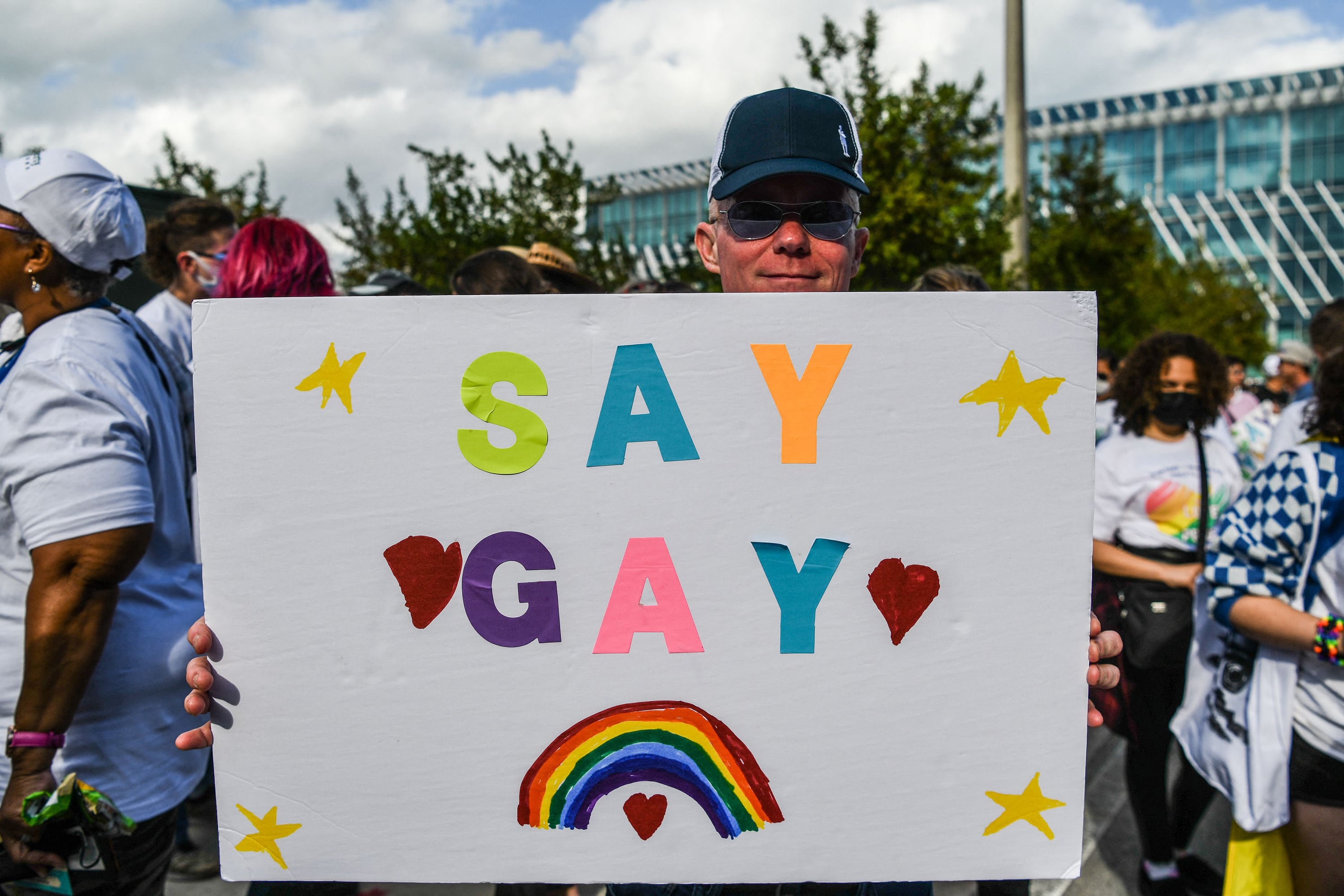Sign up for Chalkbeat’s free weekly newsletter to keep up with how education is changing across the U.S.
Florida teachers can place a photo of their spouse on their desk. School libraries can stock books featuring LGBTQ characters. And anti-bullying efforts can protect LGBTQ students. But restrictions on classroom instruction related to sexuality and gender identity remain.
Those are the terms of a settlement agreement that puts an end to a lawsuit challenging what’s commonly known as Florida’s “Don’t Say Gay” law. Advocates are hailing the lifting of a “shadow” that had fallen over the state’s schools. Gov. Ron DeSantis, who made challenging “woke” ideas in schools a cornerstone of his political brand, also declared victory.
The resolution calls attention to the enormous gray areas created by laws restricting how teachers talk about gender, sexuality, race, and history. These laws simultaneously touch on issues of personal identity where federal law protects students and teachers, and issues of curriculum and instruction where states have broad authority.
Fearful of lawsuits and state investigations, teachers have emptied out classroom libraries, taken down Pride flags, and quit their jobs. A high school class president was told he couldn’t mention being gay in his graduation speech. State officials have blamed local leaders for going beyond the requirements of the law, but never formally clarified what was and wasn’t covered — until the settlement agreement was signed Monday.
Essentially, the agreement means that the law won’t force teachers back into the closet or prevent students from talking about who they are.
Under the agreement, the Florida Department of Education will also disseminate guidance about the law to all 67 school districts.
“The vagueness of this law was intentional,” said Joe Saunders, senior political director at Equality Florida, a statewide LGBTQ rights group and one of the plaintiffs in the lawsuit. “At any point, [state officials] could have offered deeper guidance and didn’t. The only reason they’ve done it now is because we sued them in federal court and forced them to end the most harmful aspects of this law.”
Laws restricting teaching have wide-ranging impacts
As classroom restrictions proliferate, a survey by the research group RAND found that two-thirds of teachers reported self-censoring how they talk about certain social and political issues in the classroom, whether they lived in a state with formal restrictions or not. RAND also found — in a study released this week — that a majority of teachers thought these restrictions harmed learning and made students feel less welcome and less empathetic.
Teachers in Florida were the most likely to be aware of their state’s restrictions, and the most likely to report having changed instruction in response, RAND found. Florida also had more laws restricting instruction than other states.
A recent Washington Post analysis of FBI data found that school-based hate crimes against LGBTQ students quadrupled in states that passed restrictive laws, which include laws governing teaching as well as which bathrooms and sports teams transgender children have access to.
The relationship between state policies and bullying has been in the national spotlight after the death of Nex Benedict, a nonbinary student who died in February after a fight in their Oklahoma high school.
Related: ‘Am I not allowed to mention myself?’ Schools grapple with new restrictions on teaching about gender and sexuality
Some state laws ban discussion of certain topics or require that lessons be “age appropriate” or avoid “divisive” framings, while others require parental notification and the opportunity for parents to opt students out of lessons. Many states leave enforcement to school districts and provide little guidance.
Advocates of these laws say parents have a right to know what their children are being taught, especially on issues that might conflict with their own values, and that schools should focus on core academic subjects.
Students and teachers in states with teaching restrictions told Chalkbeat about LGTBQ student clubs receiving less support, and lessons in literature and history being scaled back to avoid talking about queer references in literature or the movement for gay civil rights.
Legal challenges to these laws are underway in a number of states, but how courts will rule could depend on specifics in individual states. Arizona’s teaching restrictions were struck down, for example, because lawmakers had wedged them into the state budget.
Keira McNett, staff counsel for the National Education Association, said the settlement is important in Florida and “for the national tenor.”
“Many states modeled their law after Florida’s and many are facing lawsuits of their own,” she said. “In many cases, they are overly broad. And when the state is required to actually explain what these vague laws mean, they explain it in a way that is a lot more narrow.”
Settlement provides clarity for classrooms, activities
Roberta Kaplan, the lead attorney for the lawsuit, said the settlement provides immediate relief to Florida students, parents, and teachers who were living under a cloud of uncertainty.
“Every kid should be able to go to public school and have their dignity respected and their family respected,” Kaplan said.
The settlement lays out examples of what’s allowed under Florida law, known formally as the Parental Rights in Education Act:
- Teachers can respond to students who choose to discuss their own families or identities and can grade essays that include LGBTQ topics.
- Teachers can make reference to LGBTQ people in literature or history.
- Student-to-student speech and classroom debates can touch on LGBTQ issues.
- Schools can explicitly protect LGBTQ students in anti-bullying efforts, and teachers can have “safe space” stickers in their classroom.
- Students of the same gender can dance together at school dances and wear clothing considered inconsistent with their gender assigned at birth.
The settlement clarifies that restrictions on classroom instruction apply “regardless of viewpoint.” In other words, teachers can’t teach a lesson on modern gender theory to elementary students, nor can they teach those students that gender identity is immutable and determined by biological traits.
Kaplan said states have significant authority over curriculum, and that the part of the law specifying such restrictions was unlikely to be overturned on further appeal.
DeSantis’ office in a press release emphasized that the law as written remains intact and “children will be protected from radical gender and sexual ideology in the classroom.”
“We fought hard to ensure this law couldn’t be maligned in court, as it was in the public arena by the media and large corporate actors,” Florida General Counsel Ryan Newman said in the press release. “We are victorious, and Florida’s classrooms will remain a safe place under the Parental Rights in Education Act.”
Settlement ‘allows for a reasonable conversation’ on instruction
Suzanne Eckes, a professor of educational law and policy at the University of Wisconsin, said Florida’s law and others that are vague and broad potentially violate federal laws and protections.
As employees, teachers have limited free speech rights in the classroom, but states cannot discriminate against them on the basis of sex, which forms the basis of many legal protections for LGBTQ people. For example, they can’t penalize a teacher for having a picture of a same-sex spouse on their desk while allowing a colleague to have a picture of her husband. The federal Equal Access Act says that schools can’t limit extracurricular clubs based on their content. Bible study groups, future homemakers, and gay-straight alliance clubs all have the right to meet in school, Eckes said.
Eckes said the settlement suggests the challengers had viable claims on equal protection grounds, even as the state maintains the right to regulate curriculum and prevent teachers from offering personal opinions to a captive audience.
While the settlement creates no legal precedent, it could encourage some school district lawyers, even in other states, to reach less restrictive interpretations of their states’ laws. At the same time, even in Florida, there may be disagreements about what exactly constitutes instruction.
“If a teacher does give an opinion in class, there is this overall idea that teacher speech can be curtailed,” she said. “That is a grayer area than banning the gay-straight alliance or pulling all the books off the shelves due to your own ideology.”
Derek Black, a professor of constitutional law at the University of South Carolina, said the settlement could change the political and cultural calculus around sweeping prohibitions, even though it doesn’t set a precedent for other lawsuits.
“If DeSantis is willing to settle, maybe it’s OK for the governor of Oklahoma to settle,” Black said. “Maybe it denies cultural conservatives the ability to say that some governor or AG in another state is weak.”
The settlement also offers teachers important clarity, Black said: “This type of settlement rebalances things so you don’t have to be so afraid and that allows for a reasonable conversation about what’s instruction and what’s not.”
Michael Woods, a high school teacher in Palm Beach County who leads the Florida Education Association’s LGBTQ caucus, said he’s thrilled with the settlement even as he fears it will take decades to get back to the level of inclusion teachers and students experienced just a few years ago.
His school district’s guide for supporting LGBTQ students shrunk from 140 pages to 14 under Florida’s law, he said. And he stopped leading his school’s GSA club because he would have needed to send permission slips home, which led him to worry about outing students. He’s not sure that’s changed.
Woods also worries about colleagues in smaller, more conservative communities, and about trans educators who often face even more hostility than gay and lesbian teachers.
Still, he hopes teachers in other states feel inspired.
“One of the most hateful states in the nation for LGBTQ rights reached a settlement,” he said. “You have to fight, but it can happen.”
Erica Meltzer is Chalkbeat’s national editor based in Colorado. Contact Erica at emeltzer@chalkbeat.org.





